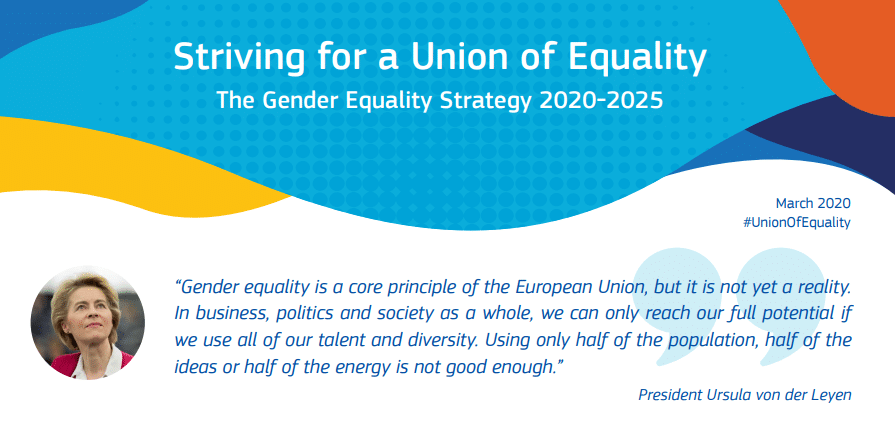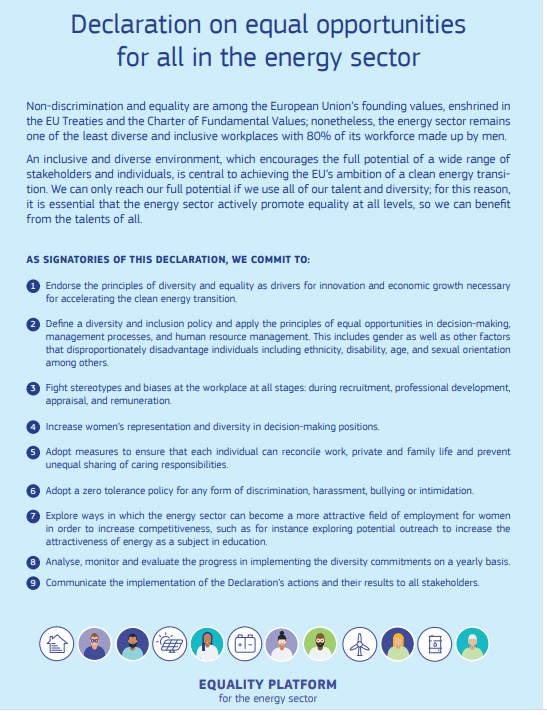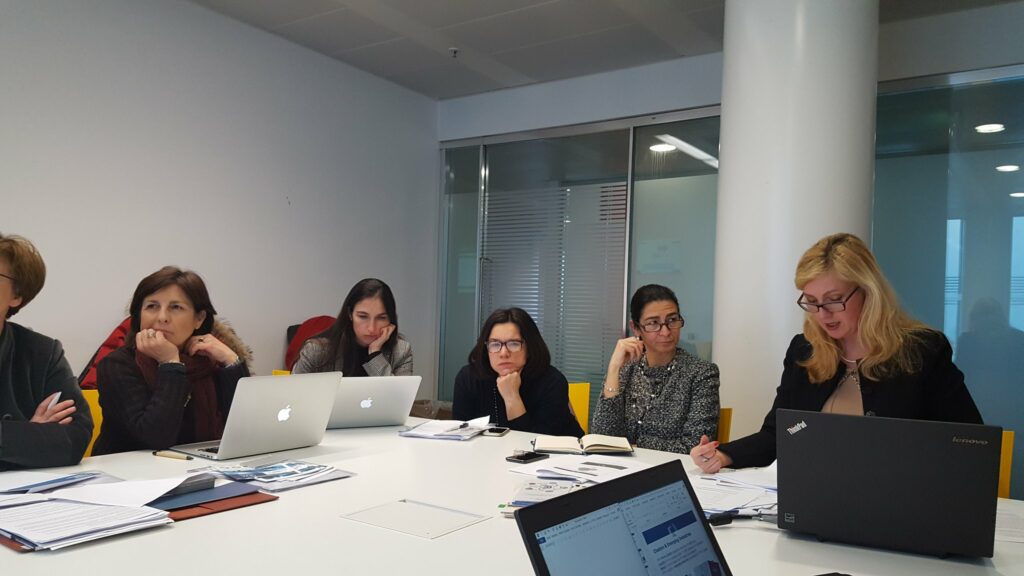A “glass half full”: the increasing role of women in the clean energy transition
This second instalment of the Topic of the Month: Women in the energy transition by Anna Sobczak (Robert Schuman Fellow at the FSR and permanent official of the European Commission) tackles how the EU is gearing up to create better opportunities for women in energy.
The role of women in advancing the clean energy transition is gaining momentum within academia and society, driving policymakers’ attention to the need to facilitate and increase the participation of women in the path towards climate neutrality.
As the momentum grows, it is policymakers, including those in at the European Commission, who have been shouldering responsibility for societal shortcomings relating to gender equality: they have been criticised for lacking ambitions when it comes to gender-inclusive energy policies, and – in the face of the EU Green Deal’s leitmotiv – even accused to leave women behind in the transition towards climate neutrality.
While criticism might be on point in some cases, this article reviews the efforts put forward by the European Commission over the years to provide opportunities for women to be more active in the energy sector and contribute to the clean energy transition in line with EU Green Deal, Europe’s growth strategy.
Gender equality in the EU: the situation at a glance
For instance, a study commissioned by the European Parliament on ‘Women, Gender Equality and the Energy Transition in the EU”[1] identifies gender inequalities as issues preventing women from contributing to the energy transition and from progressing in their careers. Similarly, an IEA’s report [2] analyses a gender bias existing in the energy sector – a sector that has been lagging behind in gender diversity themes since its creation and is currently making considerable efforts to change this imbalance. The IEA points out that the energy sector has historically been male-dominated, with 76% fewer women. Yet, the same report indicates that the sector’s transformation towards sustainable clean energy sources provides “a golden opportunity for greater gender diversity” and for women to tap into new opportunities.
Among all the sectors in Europe, the energy one is significantly male-dominated, especially considering the most traditional branches like fossil fuels, where women account for only 16%[3]. However, the transition towards climate neutrality offers more opportunities for women to tap into employment opportunities in renewables: according to the recent IRENA’s Renewable Energy and Jobs Annual Review [4], women already account for one-third of jobs in solar energy, and, with the right policy measures in place, this share can only be increased.
The importance of equality, inclusiveness and fairness across the EU
Equality between men and women is a fundamental principle of the EU, guaranteed in the Treaty on the Functioning of the European Union (TFEU)[5], and it is one of the main objectives of the EU.
Art. 8 of the TFEU states: “In all its activities, the Union shall aim to eliminate inequalities and to promote equality between men and women.” Equality, sustainability, and security are essential domains for an effective energy policy formulated in a “gender-neutral” manner. Along the same lines, the EU Green Deal[6], Europe’s current growth agenda, emphasizes climate neutrality with a just transition at its core. It emphasises that “the transition can only succeed if it is conducted in a fair and inclusive way”, highlighting the importance of inclusiveness, justice and fairness in the clean energy transition and a need to ”bring together citizens in all their diversity, (…) leaving no one behind”.
Yet, studies analysing the potential effects of the EU Green Deal’s policies on women in the energy sector, like the one recently published by Friedrich-Ebert-Stiftung, in collaboration with the European Environmental Bureau (EEB) and WECF[7], criticise that the EU Green Deal falls short of its promises to achieve a Union of Equality and remains, to a large extent, “gender blind”.

EU policies enhancing the role of women in the clean energy transition
Specifically for the energy sector, the Governance of the Energy Regulation, as part of the Clean Energy Package [8], clearly indicates the necessity of promoting gender equality when taking action to address climate change. In fact, all Member States (MSs) were called to “respect, promote and consider their respective obligations” to integrate gender equality in their National Energy and Climate Plans (NECPs) and to report how the implementation of their NECPs contributes to gender equality [9].
The question remains whether the MSs indeed addressed gender equality in their individual NECPs. The European Commission’s EU-wide assessment of National Energy and Climate Plans [10]– with a focus on driving forward the green transition and promoting economic recovery through integrated energy and climate planning – does not mention whether any MSs integrated gender equality in their NECPs.
Now the time has come for the MSs to update their NECPs, and last year (December 2022), the European Commission published detailed guidelines encouraging them to “speed up the transition towards climate neutrality in a fair manner”. In particular, for women in the energy sector, they indicate a need to “ensure balanced and equal access to education and job opportunities at all levels and in all sectors, for instance, by reducing the current gender imbalance that has so far characterised STEM [11] students and the energy sector”. In this context, in their updated NECPs, all the MSs will be obliged to demonstrate what actions they will put forward to boost clean energy jobs for women and reduce gender imbalances in the sector. This may include putting forward specific training to enhance women’s competencies in clean energy, also considering that the focus on skills development is evidently illustrated in the framework of the European Year of Skills 2023.
As part of the process, the European Commission promises to engage more people in the labour market, in particular women and young people. The measures to be taken shall include activities at the European, national, regional or local level linked to the objectives of the European Year of Skills, such as addressing current and future skills needs, particularly useful for “the green and digital transitions, the core sectors in need of recovery from the pandemic, energy crisis and the impact of Russia’s war of aggression in Ukraine” [12]. In addition, EU policymakers recognise that increasing women’s participation in the labour market has a significant positive impact on the economy, notably in the context of a shrinking workforce and skills shortages and the ambitious Porto target of employment of 78% by 2030 [13].
At the beginning of her current mandate, Ursula von den Leyen – the first female President of the European Commission – made it clear how gender equality is close to her heart.
 The EU Gender Equality Strategy [14] was a first milestone for the President meant to deliver on the von der Leyen Commission’s commitment to achieving a Union of Equality. The Strategy presents policy objectives and actions to progress significantly towards a gender-equal Europe by 2025. In the EU Gender Equality Strategy, there is an explicit reference to the policies under the EU Green Deal, which can impact women differently than men: “women and men are not equally affected by green policies tackling climate change (there are less possibilities for women as climate refugees), or the clean transition (there are more women in energy poverty)” [15]. Therefore, the Strategy emphasises that addressing the gender dimension can have a key role in leveraging the full potential of these policies, including those impacting the energy sector.
The EU Gender Equality Strategy [14] was a first milestone for the President meant to deliver on the von der Leyen Commission’s commitment to achieving a Union of Equality. The Strategy presents policy objectives and actions to progress significantly towards a gender-equal Europe by 2025. In the EU Gender Equality Strategy, there is an explicit reference to the policies under the EU Green Deal, which can impact women differently than men: “women and men are not equally affected by green policies tackling climate change (there are less possibilities for women as climate refugees), or the clean transition (there are more women in energy poverty)” [15]. Therefore, the Strategy emphasises that addressing the gender dimension can have a key role in leveraging the full potential of these policies, including those impacting the energy sector.
As one of the ways to promote equality and inclusion in the energy sector, the European Commission established in 2021 an Equality platform for the energy sector aimed at offering a space for discussion of issues relating to equality, facilitating exchanges of experiences, and highlighting best practices. The rationale behind the Platform is that the energy sector should offer equal opportunities at all levels, from energy professionals and decision-makers to consumers, an objective expressed in a “Declaration on equal opportunities for all in the energy sector”. The Declaration signatories [16] commit – among others – to increase women’s representation and diversity in decision-making positions and to explore ways in which the energy sector can become a more attractive field of employment for women, who could contribute to increasing its competitiveness, such as, for instance, by boosting the attractiveness of energy as a subject in education.
Based on the aforementioned examples of EU policy-making efforts, we are certainly on the right trajectory for enhancing the role of women in energy. Female professionals have many opportunities to tap into the clean energy transition. What women in the energy sector need to do now is to support each other, cooperate, exchange experiences and continue developing competencies and skills, enabling the net zero target. Paraphrasing the words attributed to Mary Robbins [17], a former U.N. climate envoy, climate change is a man-made problem, but it is women, with their expertise and active engagement in the clean energy transition, who can make a real difference and offer new solutions to reach climate neutrality.
Note:
The Florence School of Regulation (FSR) at the European University Institute (EUI) is a full member of the European Commission’s Equality platform for the energy sector. The FSR set up the Lights on Women initiative (LoW) to champion gender equality in the energy sector, especially through its Energybase, a database that allows companies and institutions to identify women specialising in energy, climate and sustainability. Find out more here.
References:
- EP study on Women, Gender Equality and the Energy Transition in the EU, 2019 https://www.europarl.europa.eu/thinktank/en/document/IPOL_STU(2019)608867
- IEA report on Understanding Gender Gaps in Wages, Employment and Career Trajectories in the Energy Sector, August 2022, https://www.iea.org/data-and-statistics/data-tools/gender-and-energy-data-explorer
- Eurostat data on Jobs with the highest share of women in Q3 2021, 2022, https://ec.europa.eu/eurostat/documents/4187653/13722720/Share+of+women+by+economic+activity_WEB.png
- IRENA’s Renewable Energy and Jobs Annual Review 2022, https://www.irena.org/-/media/Files/IRENA/Agency/Publication/2022/Sep/IRENA_Solar_PV_Gender_perspective_2022.pdf?rev=61477241eb9e4db2932757698c554dc2
- Treaty on the Functioning of the European Union. https://eurlex.europa.eu/LexUriServ/LexUriServ.do?uri=CELEX:12012E/TXT:en:PDF
- Communication from the Commission to the European Parliament, the European Council, the Council, the European Economic and Social Committee and the Committee of the Regions, The European Green Deal, COM/2019/640 final, https://eur-lex.europa.eu/legal-content/EN/TXT/HTML/?uri=CELEX:52019DC0640&from=EN
- Friedrich-Ebert-Stiftung, European Environmental Bureau and WECF, A Feminist European Green Deal: Towards an Ecological and Gender Just Transition, 2022, https://eeb.org/library/a-feminist-european-green-deal-towards-an-ecological-and-gender-just-transition/
- European Commission, Directorate-General for Energy, Clean energy for all Europeans, Publications Office, 2019, https://data.europa.eu/doi/10.2833/9937
- Regulation (EU) 2018/1999 of the European Parliament and of the Council of 11 December 2018 on the Governance of the Energy Union and Climate Action, amending Regulations (EC) No 663/2009 and (EC) No 715/2009 of the European Parliament and of the Council, Directives 94/22/EC, 98/70/EC, 2009/31/EC, 2009/73/EC, 2010/31/EU, 2012/27/EU and 2013/30/EU of the European Parliament and of the Council, Council Directives 2009/119/EC and (EU) 2015/652 and repealing Regulation (EU) No 525/2013 of the European Parliament and of the Council https://eur-lex.europa.eu/legal-content/EN/TXT/HTML/?uri=CELEX:32018R1999&from=EN
- Communication from the Commission to the European Parliament, the European Council, the Council, the European Economic and Social Committee and the Committee of the Regions, An EU-wide assessment of National Energy and Climate Plans, Driving forward the green transition and promoting economic recovery through integrated energy and climate planning https://eur-lex.europa.eu/legal-content/EN/TXT/HTML/?uri=CELEX:52020DC0564&from=EN
- STEM is an acronym for the fields of science, technology, engineering and math.
- Proposal for a Decision of the European Parliament and of the Council on a European Year of Skills 2023, https://commission.europa.eu/system/files/2022-12/COM_2022_526_1_EN_ACT_part1_v6.pdf
- European Council, The Porto declaration https://www.consilium.europa.eu/en/press/press-releases/2021/05/08/the-porto-declaration/
- Communication from the Commission to the European Parliament, the European Council, the Council, the European Economic and Social Committee and the Committee of the Regions, A Union of Equality: Gender Equality Strategy 2020-2025
- Idem
- As of March 2023, 25 signatories of the Declaration include: EUI (Florence School of regulation), 75inQ, AEMENER, Spanish Association of Women for Energy, Associació Ecoserveis, Association of the European Distribution System Operators (E.DSO), CEN-CENELEC, Cleanwatts, Deloitte, Elia Group, ENAGÁS, ENERGIA International Network on Gender & Sustainable Energy, Energy Community, Engie Impact, EPIA SolarPower Europe, ETRA Investigación y Desarrollo (ETRA I+D), Femme Works, Global Women’s Network for the Energy Transition (GWNET), Grupo Red Eléctrica, Next Energy Consumer, Renewables Grid Initiative, REScoop.eu, RETE ASSIST, RWE AG, Slovenian Association for energy economics (SAEE), Wiener Stadtwerke
- According to Mary Robinson, “climate change is a ‘man-made problem with a feminist solution”. https://www.reuters.com/article/us-global-climatechange-women-idUSKBN1JE2IN






